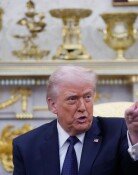U.S.-N. Korean steps signal major shift
U.S.-N. Korean steps signal major shift
Posted October. 13, 2000 14:38,
The United States-North Korean joint communique issued Oct. 12 comprises too important contents to be called a product made during a four-day visit to the United States by Jo Myong-Rok, first vice chairman of the North Korean Defense Commission.
First of all, the declaration that the two sides will end past antagonism against each other has a tremendous implication, as it made officially clear the intent to terminate five decades of a bilateral relationship of enmity since the 1950-1953 Korean War.
From now on, North Korea should bury the hatchet at least officially against the United States, which it had called an implacable enemy and arch-enemy American imperialists. Noting that the anti-Americanism has so far served as a leverage for the North Korean leadership to control the people, the shifts impact on the North Korean society could be tremendous.
As for the United States, it will be inevitable to make a comprehensive change to its conventional policy against its former enemy, since it has removed the title of rogue state from the North. Before anything else, the Clinton administration's national missile defense system proposal will face a rising challenge from the opponents, as the plan was promoted on the premise of countering North Korean missile attacks.
North Korea promised not to test fire long-range missiles, trying to dispel U.S. horrors of the possibility of missile attacks. And the North reaffirmed the Agreed Framework reached between the two countries Oct. 21, 1994, thus attempting to spell out the American apprehension over nuclear proliferation.
The two sides concurred to support the international effort against terrorism, which could lead to the removal of North Korea from the list of terrorism sponsoring states.
In addition, the two countries touched on the possibility of bilateral economic cooperation with the exchanges of economic and trade specialists.
Special attention is paid to the stipulations that there are many steps, including the four-party peace talks, to be taken for officially ending the Korean War and settling a viable peace on the Korean peninsula through the replacement of the 1953 Armistice with a viable peace mechanism. Pyongyang's accommodation of the four-way talks marks another significant step in favor of the Seoul and Washington side.
The accord on the mutual respect for each other's state sovereignty and non-interference principle for domestic affairs leaves room for the conservatives to take issue. This is because the North has demanded the withdrawal of U.S. troops from Korea for the safeguard of national sovereignty and non-interference with domestic affairs. However, since Kim Jong-Il is said to have acquiesced to the continued U.S. military presence in Korea even after the reunification, it is pointed out that any excessive Cold-War logic is incompatible with the evolving reality.
Park Jei-Gyoon phark@donga.com







